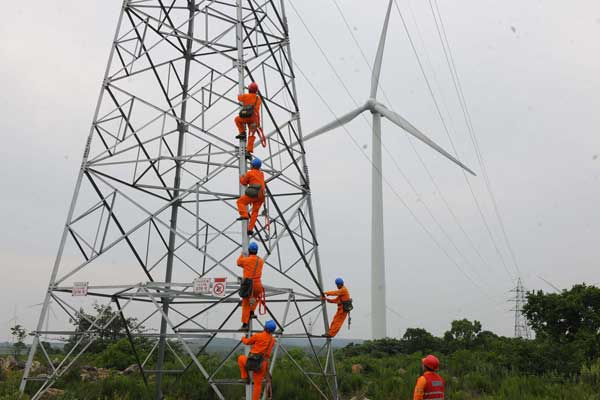Spending surge for renewables
Updated: 2013-07-31 00:04
By DU JUAN (China Daily)
|
|||||||||||
Conservation, emissions cut part of plan to deal with climate change: official
China's investment in renewable energy during the 12th Five-Year Plan (2011-15) will reach 1.8 trillion yuan ($294 billion) in addition to 2.3 trillion yuan being spent on energy-saving and reducing harmful emissions to realize a commitment to cope with climate change, said a senior official on Tuesday.
"China has carried out a series of policies to cope with climate change and we have achieved some success after several years of effort," said Xie Zhenhua, deputy director of the National Development and Reform Commission, during the Caring for Climate China Summit held by Global Compact Network China in Beijing on Tuesday.
 |
|
Technical workers conduct maintenance of the power transmission system at a wind-power farm in Chuzhou, Anhui province. The country plans massive investment to boost the proportion of renewable energy in the total energy mixture. PROVIDED TO CHINA DAILY |
From 2006 to 2012, China's energy consumption per unit of gross domestic product was reduced by 23.6 percent, which is equal to a reduction of 1.8 billion metric tons of carbon emissions, Xie said.
However, he admitted that China's economic development, which heavily depends on high-energy consumption and high levels of emissions, has not changed yet and the country's emissions per capita are higher than the global average.
China has made a commitment to the world that it will reduce its carbon emissions per unit of GDP by 40 to 45 percent by 2020 from the 2005 level and raise its non-fossil energy consumption percentage to 15 percent of the primary energy mixture.
"China will continue to make great efforts on reducing emissions, improving air quality and accelerating sustainable economic development," said Xie. "In every five-year plan, we have outlined specific energy-saving and emission reduction targets."
In a video address to the summit, Ban Ki-moon, secretary-general of the United Nations, said China's contribution to the Global Compact, a UN initiative to encourage businesses worldwide to adopt sustainable and socially responsible policies and to report on their implementation, has benefited the global economy and socially sustainable development.
He said coping with climate change actively has significant meaning for both the UN and business and hopes that an increasing number of companies can participate in the Global Compact Network China.
At present, more than 300 companies have joined the network in China.
The UN is working on forming legal agreements among governments to cope with climate change by the end of 2015 and aiming to make them come into effect by 2020.
Sinopec Group, Asia's largest refiner, announced during the conference that it will invest about 22.6 billion yuan to upgrade its current production equipment and operations to protect the environment in an effort to realize green development and cope with climate change.
Fu Chengyu, president of the company, said enterprises should pay increasing attention to social and environmental benefits and not concentrate solely on gaining profits.
"Companies can make profits and protect the environment at the same time through responsible investments and production," he said.
As a high energy-consumption company, Sinopec has been working toward greener development in the past decade.
Its biofuel research for aircraft and carbon capture and utilization has been put into many applications, which has promoted clean energy use and emissions reduction.
The company published an environmental protection report on Nov 29 last year, the first time a Chinese company had done such a thing.
"Enterprises are the major players in solving global environmental issues," said Georg Kell, executive director of the UN Global Compact Office. "Companies can improve green technology and promote its application."
Related Stories
Carbon market helps cut emissions 2013-07-29 08:39
China to use scientific methods to record enterprises'carbon emissions 2013-07-26 10:14
State Council gives approval to tough air emissions plan 2013-07-25 07:19
Carbon emissions trading gains momentum in China 2013-07-21 21:32
Carbon emissions trading gains momentum in China 2013-07-21 21:32
China reports drops in emissions of major pollutants 2013-06-04 17:46
Today's Top News
Berlusconi conviction upheld; prison term sticks
Aso cites Nazis for constitutional amendment
Property prices rise again
China 'confident' on trade
China 'to add more to global growth'
US rethinking Putin summit
UK companies back EU referendum
Medical giant loses antitrust lawsuit
Hot Topics
Lunar probe , China growth forecasts, Emission rules get tougher, China seen through 'colored lens', International board,
Editor's Picks

|

|

|

|

|

|





